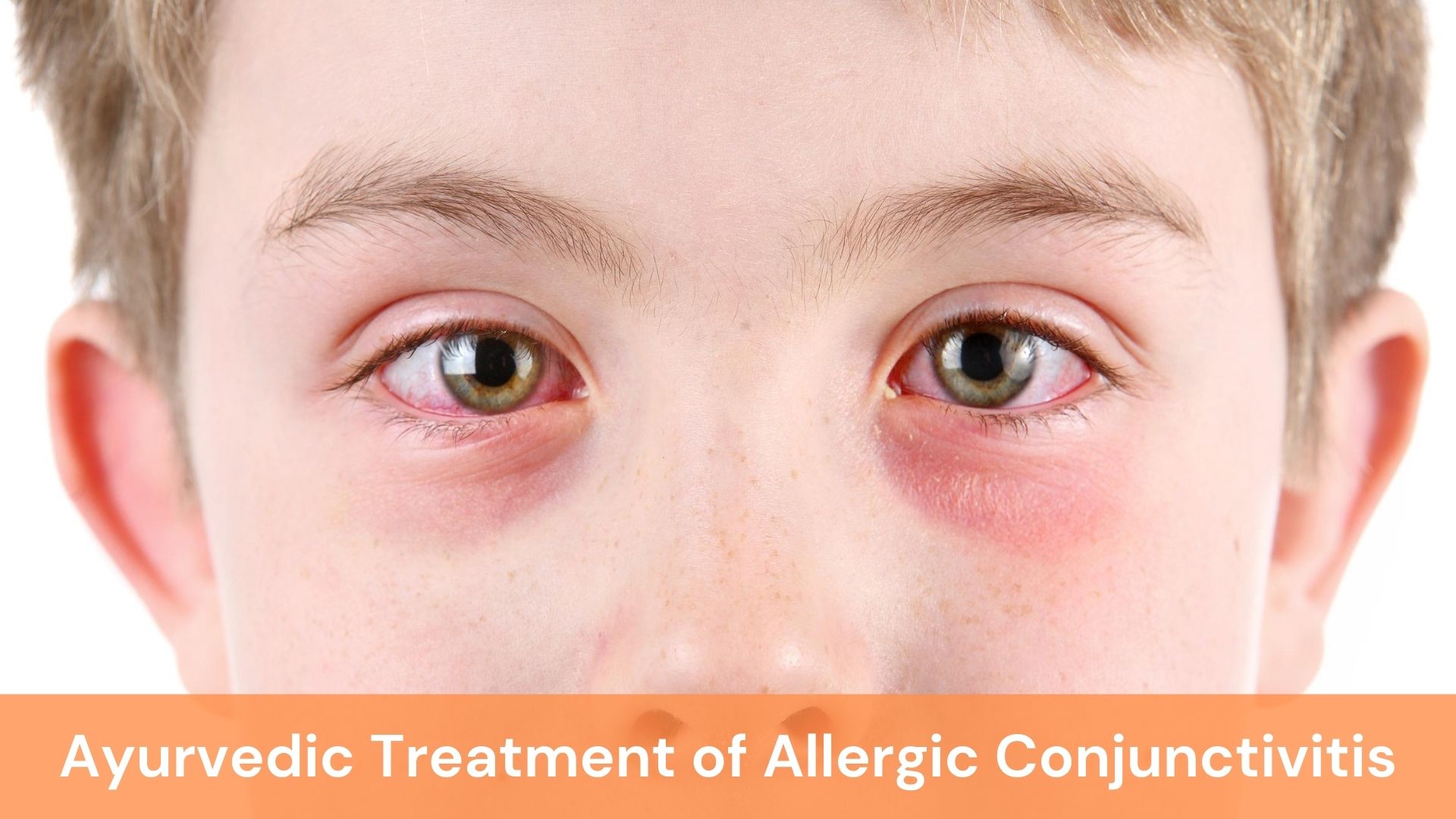Allergic Conjunctivitis is the most common type of eye allergy and is widely experienced by the population worldwide. It is the allergic reaction of the eyes caused due to various irritants. Allergic Conjunctivitis is also known as Ocular Allergy. Due to the rise in environmental pollution, industrialization etc., the incidence of allergic conjunctivitis is increasing.
What are the Symptoms of Allergic Conjunctivitis?
- Redness
- Itching
- Burning sensation
- Photophobia
- Discharge from the eyes
What are the Causes of Allergic Conjunctivitis?
Allergens that travel through air are the major causative factors of allergic conjunctivitis. These include:
- Dust
- Pollen grains
- Molds
- Chemical-based cosmetics
- Feather and fur of pet animals
- Contact lens such as materials accumulated on the surface of the lens.
What is the Treatment of Allergic Conjunctivitis?
In Ayurvedic texts, the signs and symptoms of Abhishyanda on the basis of symptoms such as toda (pricking pain), parushya (dryness), vishushka bhava (feeling of dryness), alpa dushika (discharge), kandu (itching) etc. It is of four types depending on the predominant dosha i.e. Vataj, Pittaj, Kaphaj and Raktaj Abhishyanda.
In allergic conjunctivitis, Vata is the predominant dosha along with other vitiated doshas.
The ultimate aim of Ayurvedic treatment of allergic conjunctivitis is to enhance the general immunity of an individual. To correct the disorder from its root level, local as well as oral formulations are used that are helpful in pacifying the signs and symptoms of allergic conjunctivitis.
Institute of Applied Food Allergy® (IAFA) treats the patients of Allergic Conjunctivitis on the principles of Ayurveda. The herbal formulations manufactured by IAFA for ayurvedic treatment of allergic conjunctivitis have the potential to successfully manage the condition without any adverse effects.
External Herbal Remedies for Allergic Conjunctivitis by IAFA
1. Triphaladi Eye Drops
In Ayurveda, Ashchyotana (topical drops) is considered as the first line of treatment in all eye ailments. When topical drops are instilled in the eyes, it passes through Netra Sandhi (ocular junction), sira (blood vessels), nasika (nose), mukha srotas (oral cavity) and expels mala (waste) of urdwajatru (above clavicle).
How to Use: Instil 2 drops of Triphaladi Eye Drops in both eyes twice a day.
2. Shigruadi Eye Drops
Shigruadi eye drops contain the standardized extract of the herb Moringa oleifera. Shigru is highly effective in symptoms such as Toda, Prakashsangyata (photophobia), Guru (heaviness), srava (discharge), picchil srava (mucus discharge), muhurmuhur srava (repeated lacrimation), daha (burning sensation) and Kandu (itching) associated with allergic conjunctivitis.
How to use: Instil 2 drops of Triphaladi Eye Drops in both eyes twice a day.
Internal Herbal Remedies for Allergic Conjunctivitis by IAFA
1. Capsule Curcumin with Piperine
IAFA’s Curcumin Capsules contain the goodness of alkaloid curcumin found in turmeric along with piperine. The anti-inflammatory, anti-allergic and immuno-modulatory effects of both these compounds help in enhancing immunity and help in recovery by reducing the infection.
Dose: Take 2 capsules once a day with lukewarm water early in the morning.
2. Respiratory Care X Drops (Kids Herbal Formula)
Respiratory Care X Drops by IAFA is an efficient herbal formula to treat allergic conjunctivitis in children. The herbs present in these drops have anti-inflammatory, anti-allergic and immune enhancing properties. In this herbal formulation, 10 herbs are used mainly Vasa (Adhatoda vasica), Yashtimadhu (Glycyrrhiza glabra), Surssa (Ocimum sanctum), Jivanti (Leptadenia reticulata), Kanthkari (Solanum surattense), Ela (Elettaria cardamomum), Haridra (Curcuma longa), Bhumi Amalaki (Phyllanthus niruri), Bruhati (Solanum indicum) and Agaru (Aquilaria agallocha).
Dosage: Children (0-1 year): 2-3 drops with 10 ml water on an empty stomach. Children (1-10 years): 5-10 drops with 20 ml water on an empty stomach. Above 10 years and up to 14 years: 1-2 ml with 30 ml water on an empty stomach.
This medication can also be taken with juice or sugar syrup.
3. Total Care 3X Ras
IAFA’s Total Care 3X Ras is an herbal formulation having a triple-action formula. It helps in the treatment of allergic conjunctivitis due to the presence of anti-inflammatory, anti-allergic and immuno-modulatory herbs. The herbs present in Total Care 3X Ras are: Satyanashi (Argemone mexicana), Dronpushpi (Leucas cephalotes), Sirisha (Albizia lebbeck), Bhumi amla (Phyllanthus niruri), Vasa Putapaka (Adhatoda vasica), Dugdhika (Euphorbia hirta), Yavakshara (Hordeum vulgare) and Yashtimadhu (Glycyrrhiza glabra). All these herbs work in a synergistic manner and provide relief in allergic conjunctivitis without causing any side effects.
Dose: 30 ml with water twice a day.
Single Herbs that are Useful in the Treatment of Allergic Conjunctivitis
- Shigru (Moringa oleifera)
- Haridra (Curcuma longa)
- Daruharidra (Berberis aristata)
- Yashtimadhu (Glycyrrhiza glabra)
- Amalaki (Emblica officinalis)
- Guduchi (Tinospora cordifolia)
Do’s and Don’ts in Allergic Conjunctivitis
- Use sunglasses while going out.
- Keep your surroundings clean.
- Practice eye exercises.
- Exposure to dust, smoke and other allergens should be avoided.
- Rubbing of eyes should not be done.
- Continuous use of computers, mobile phones and T.V. should be avoided.
- Some yogic postures such as Sukhasana, Shavasana are effective.
- Pranayama is also effective. Eye exercise such as staring on a specific point like a small dot or a source of light like a candle.
Conclusion
Thus, Ayurvedic treatment for allergic conjunctivitis is significantly effective and clinically safe with no adverse effects. Contact us to get consulted with our health experts now.








